Since I took on the role of Community Support Officer in September, I have been investigating how European NRENs are addressing the technological evolution and the opportunities and challenges it has created for teachers and students. I discovered that many NRENs are working on similar issues in different stages, however the information about these activities and the commonalities among GÉANT members are not shared. Knowledge sharing to help facilitate those efforts are needed in this field.
One of my first steps was to reach out to Christien Bok, head of the educational services team of SURFnet and talk about their inspirational take on accelerating the innovation in the Dutch educational system. She introduced me to the Acceleration Plan Educational Innovation with ICT from SURF, VSNU and the Association of Universities of Applied Sciences. After our discussion I accepted the kind invitation to join the SURF study trip to the annual EDUCAUSE conference in 2018. By joining them I have gained valuable insight from the perspectives of CIOs, information managers, directors, policy advisors, professors and project leaders from Dutch universities, high schools and other higher educational institutions. What follows is a short report of the trip and what I have learned.
The day after arriving in Denver with the SURF study group, we had a visit of the Colorado State University, where after a short introduction from SURF and GÉANT, they gave us an insight into their innovation focus. CSU has been for a long time working with learning analytics, OER, affordable learning materials, adaptive learning environments, student success initiatives (SSI), online courses and microcredentials. They shared both their successes as well as what went wrong on the way and what were the challenges. Universities are competing to get more students each year and to get more successful graduates. Other challenges were to eliminate the gap for first generation students, students of color and low-income achievement gaps. This was addressed successfully by the SSI project using both learning analytics and adaptive learning (It helped to recognize patterns and address them to customise the learning process to achieve successful graduation.). It was interesting to learn from them that students were supportive of the university using their data for the benefit of them achieving better results in their studies. Another reason for the success was their initiative within the UNIZIN consortium regarding OER, where they combine open and licensed content and also in a digital format. Working together with multiple universities and libraries in negotiating with publishers to work on more favourable deals is essential. With joining forces their negotiation power increased and they were able to negotiate to shape the tools /services to their needs beside the pricing and terms and conditions.
The annual EDUCAUSE conference started with pre-conference meetings and workshops. I attended the meeting of the Coalition of Higher Education Information Technology Associations (CHEITA). The association comprises representatives from associations, universities and NRENs throughout the world that promote the use of information technology in higher education. The group had a couple of agenda points which were keep coming up also in the European NREN circles: sharing information and approach regarding procurement and key vendors also when it comes to address functionality amendments. Other common topic was cyber security and data privacy. Everyone recognize the need to address security challenges however to get the right skilled staff is a challenge and the costs are usually significant. It is also the case with the new GDPR regulations and sharing knowledge in this area is important. GÉANT has created successful courses and task forces in both area: TRANSITS trainings, TF-CSIRT, TF-DPR which are open for the community.
The main conference sessions were about addressing the changes in higher education. These include future skills requirements and how the educational system should work on reorganising itself (microcredentials, adaptive learning, flipped classrooms…etc.) as well as adapting the content of the curriculum. This topic also came up during several sessions and at the closing plenary session, which was presented by Alexis Ohanian, co-founder of Reddit. Routine work, cognitive and manual labor will decrease and non-routine cognitive and manual work increases. Everything that can be automated will and should be. The focus of the changes within education should address areas to benefit us: new skills for new technology within a profession that either cannot be replaced by automation or skills for using technology to enhance the professional work. The other major change is adapting the credential model according to new standards and needs in the job market. When companies are looking for a new recruit, they look more for skills, achievements and courses than a completed master’s degree and the trend is growing worldwide. Organisations and universities are actively working on open badges, microcredentialing (Read SURFnet’s findings from edubadges proof of concept.) worldwide and the need to collaborate with each other to create a standardized system is there. Within the GÉANT community there are many pilots launched in this area, for example from SURFnet, UNIT and JISC. We aim to bring together the teams working on these to share their knowledge, their experiences and work together in the future to create a standardised interoperable system.
Another area for future change in higher education is the supporting technology to enhance the methodology used during classes. For example, using virtual reality can increase efficiency for everyone in this field. More students can practice simultaneously on lifelike situations or simulations, this can be done in different times and be repeated. The study time can be reduced with the help of virtual reality, saving time and costs for the educational institution and students. Furthermore it could help to increase student results. By using artificial intelligence tools and robotic tools, educators role will shift from being guides in acquiring knowledge to how to be more creative in using knowledge and tools available.
Learning analytics were another key topic during the whole trip, starting from the experience of CSU and throughout the conference sessions. It is about improving human decisions especially with regard to the value of predictive and prescribing analyses. Using mass data is a very complex subject, both in terms of how it is collected and also how the actual analysis would take place.
All in all, it is obvious that collaboration is key now and in the future. It helps to accelerate the process of change and also it helps to steer it to keep it in the right direction, assuming that we, who collaborate, agree on the vision and strategy. Our community’s future starts with educating the future generations, helping them to learn more efficiently. Our role as NRENs is to enable this to happen.
Follow up articles from other members of the study trip in Dutch:
https://www.inholland.nl/nieuws/leren–nieuwe-energie-nieuwe-kansen-creeren/
https://www.surfspace.nl/artikel/2362-de-toekomst-overkomt-ons-niet/


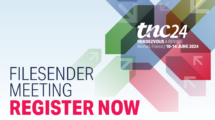
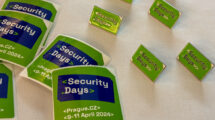

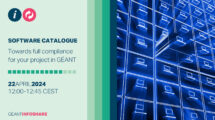
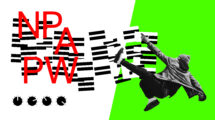
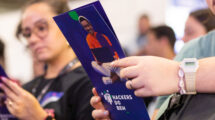
Add Comment